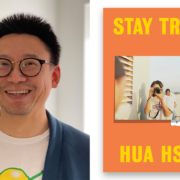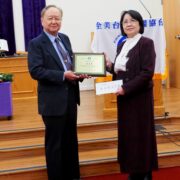My Confession
Charmian Cheng
When I was in elementary school, my favorite hangout was our tiny library. Actually, it was just a small room, with one bookcase. Through its glass doors, I could see shelves of children’s storybooks. Those paperbacks could not have worth much, but for a poor school like ours, they represented precious possessions, so they were put under lock and key. I often lingered in front of those books, but never had the opportunity to gain access to them.
Then I went to Chiayi Girls’ High School, which was one hour’s train ride from my hometown. The school library had such vast collections of books, it was beyond my wildest dreams. And on top of that, I was allowed to borrow as many books as I could carry. I felt like a fish taken to the water, what joy! Every day I immersed myself in books; but what about the textbooks? They were pushed aside and forgotten. That was why, the more I read, the worse my grades had become. I also loved to spend time in the library’s Reading Room where I could browse all sorts of magazines and periodicals, including Chinese translation of “Reader’s Digest”. For a fifteen year old child, this felt like paradise.
One summer, my sister returned home from Taipei, she brought with her a book, which she borrowed from a friend, for me to read. It was a translated book, entitled, “Crimson Letter”. The story was so fascinating that I gulped it down in just a couple of days, although there were passages in the book that were beyond my comprehension. After all, how can one expect a young girl to understand the mysterious relationship between man and woman? How can she grasp the complexity of human nature?
It was not until I went to college that I learnt the title of that book was called “Scarlet Letter”; it was written by Nathanial Hawthorne, the American writer.
Although I didn’t really understand the book when I first read it, yet its allure drew me into the world of Western literature. Meanwhile, in my high school, we were encouraged to use our spare time to delve into Chinese literature, so they displayed several famous Chinese novels on a bookshelf in each classroom, in hopes that the students would be enticed to read them. I did try to read those Chinese masterpieces, unfortunately, I found the stories so boring and so repetitive, and the characters so pedantic that I couldn’t go on, finally, I had to give up. As far as I was concerned, those stories were completely irrelevant to my everyday life, so it was no wonder that I lost interest in them. For me, it was easy to give up Chinese Literature and concentrate on Western novels. I felt that in Western fiction the characters were more vivid and lively, and the plots were much more interesting and engrossing.
I stayed in Chiayi Girls’ High School for six years. One day, during my senior year, my homeroom teacher took an hour-long train ride to my hometown, to visit my mother.
My mother and my teacher chatted pleasantly, they had such good rapport that one would think they were close friends! Eventually, their conversation turned to me. My mother took the opportunity to inquire about my grades and my chance of being accepted to college.
My homeroom teacher was a middle-aged woman, who taught “Biology” in my class. It just happened that biology was not my favorite subject; so I could guess what was coming. Indeed, she hesitated for a few seconds before answering, “I cannot say I am optimistic about her chances of being accepted to a decent college. As I am sure you know that she is often absent in class because she complains of stomach aches; she takes a lot of sick leaves.”
My mother was crestfallen, she was mortified. She never knew that I pretended to be ill and skipped classes! My mother threatened me afterwards, “Since you are not interested in learning, why not just quit school and become a sales clerk?”
“Mom, don’t believe what the teacher said; I am not as bad as she would have you believe. I admit that I skip classes because I really hate ‘Three Principles of the People’ (三民主義)! It is the doctrine that the Kuomintang regime tries to instill in the students’ minds. It is poison!
“As for ‘Biology’ class, I don’t mind as much, but it is really boring. Can you blame me if I would rather go see a movie?”
“What’s your plan for the future, huh? Want to apply for a job as a saleslady?”
“I don’t know; what do you think?” I was cheeky enough to retort my mother’s threat.
I was willful and lazy, but, at the critical juncture, I was able to shake up and make an effort. So, when time came for me to take the College Entrance Examination, I was prepared. And when the result of the college examination was announced, I was elated to learn that I had been admitted to the Law College of National Taiwan University! What an accomplishment! I had to pat myself on the back.
That whole summer, I was in cloud nine.
My mother was quite happy, too. She said, “So, you plan to study law? It will suit you. You always enjoy arguing with me, so when you graduate from college, you will become a lawyer, you will argue with everyone in the court of law and make a very nice living.”
With what exalted hope and unlimited ambition did I enter the college gate! Alas, within one year, I had come to realize that I was not of lawyerly material. I took the lofty courses, such as Constitutional law, Civil law, etc. Unfortunately, what was written in the textbooks was beyond my comprehension. What confounded me the most was the fact that, although I understood every word in the text, but when those words were put together in a sentence, I was not able to decipher its meaning.
As I feared, the final exams came and I was crushed. I didn’t think I could avoid the fate of being forced to stay behind and repeat the freshman year. All summer long I anxiously waited for the transcript to arrive, just like a criminal waiting to be sentenced. When the transcript arrived, I was relieved to see that I had passed all the courses, except for “Constitutional Law”. Clearly, I needed to retake the exam before the new school year began. I felt ashamed, and not being able to face my mom, I hurried back to Taipei and hid in the dorm room. I studied very hard to retake the final exam of “Constitutional Law”. Meanwhile I also applied to transfer from Law Dept. to Dept. of Foreign Languages and Literatures. Fortunately, the school was very lenient, so I not only passed the exam, but I was also allowed to transfer to the other department. What a great relief!
How should I describe the experience of my three years in the Dept. of Foreign Languages and Literatures? I felt like waking up every morning in the warmth of spring breeze; studying was such a pleasure. Courses such as History of Western Literature, Nineteenth Century English Novel, American Prose, English Poetry, American Novel, Greek Mythology, Greek Comedy & Tragedy, Homer’s Odyssey … they were all very enticing, like sunshine, like fresh air, like dreamy sea, I yearned for it; it intoxicated me. Some course was like a steep mountain, it beckoned me to climb; some was like a forest, it invited me to explore, to face challenge.
If studying these literary works was considered pursuit of knowledge, then acquiring knowledge was such pure pleasure. It cultivates my mind, it enriched the fabric of my life. And I had a group of dedicated professors to guide me through some rough spots, to instruct me to study in a systematic way, to pick out the essence of each literary work, and to appreciate each author’s characteristics and distinguished qualities.
I believe that seeking knowledge is a need every one craves, it is the inner urge that sustains us.
After graduating from college, I came to the United States. My intension was to further my study in English & American Literatures. Now, looking back, I realize how naive I was! How could I compete with those American students in my class? After all, English was their mother tongue, they were able to discuss and appreciate any Shakespearean play in the span of one hour’s time, whereas, in my class at Taiwan University, it took us half a semester to tackle “Hamlet”. It is like comparing a hare with a turtle. But it was not just the pace of the class’s progress that frustrated me the most. The stumbling block I had to face was a course called “Etymology”, it was the study of the origin of words and the way in which their meanings have changed throughout history. This course was so alien and so boring to me that I was not able to handle it. Finally, I decided to call it quit. I took the Greyhound Bus to New York City and never looked back.
Truth was, I could not handle the pressures of the course work, but a more pressing issue was the fact that I ran out of money. I barely had enough money to buy food, let alone buying winter coat and gloves. My plan was, I would earn some money and then go back to school the following year.
Now, we were talking about the 1960s, when thousands upon thousands of young men came to the United States from Taiwan, to pursue their graduate studies, and after getting their master’s or Ph.D., they came to New York to find work. In that great city, jobs were plenty, and the pays were good, so they settled down and eventually became U.S. citizens. The only problem was, they had to find a suitable Taiwanese/Chinese girl to start a family. Years passed, they kept looking, but no suitable girls appeared on the horizon. They became discouraged, and desperate. Some were quite old, too (well into their thirties!) The fact that they were competing with each other for suitable brides seemed quite pathetic, but there were so few female students from Taiwan, what could they do? Quite a few of them went back to Taiwan and sought out matchmakers to arrange for their marriage. Then there were others who were stubborn enough to stick around, in hopes that someday some girl might show up. That was why, when I came upon the scene, I was so welcome. After all, I was the only fresh face in the Chinese/Taiwanese social circle. In no time at all, a large swarm of bachelors came calling. They were all very eager to check me out.
Ah, that was the giddy, glorious time of my life! So many gentlemen came to my place, wanting to invite me to dinner, eager to take me out on the town. Unfortunately, my plain look disappointed most of them; and soon enough, they all beat the retreat and disappeared. In the end, there was only one left; and he happened to be the youngest of the bunch. After half a year of hanging around, he decided to propose to me! How could I say no to his offer? I was a pauper in need of a meal ticket.
I hastily changed my plan for the future, putting away my ambition, my pursuit of study, and became a wife and mother.
I would sum up my married life as lonely, but serene. Gradually, I relapsed into my old habits of burying my nose in the books whenever I could. I would take my two kids to visit the local library. However, those books I borrowed were bestsellers and romance novels. I read them purely to have fun, and to kill time. How long had I been out of college? Just a mere few years, and yet I had already forgotten all about methodology and disciplines my professors instilled in me. I read mostly books by authors such as Somerset Maugham, John O’Hara, and Daphne du Maurier. It pained me to recall that, during that period of time, I was selfish enough to take care of what I wanted, but I neglected to nurture my children’s needs for intellectual developments. I hardly ever read to them.
I stayed at home for 14 years, taking care of my two children, until my younger child entered middle school. Finally, I felt that it was time for me to go back to school and continue my study. But in the intervening years I had become more mature and more pragmatic. I had decided to abandon my dream of pursuing study in literature and take courses in Library Sciences instead. Two years later, I graduated with a Master’s degree and immediately landed a job at the East Asian Library of Princeton University, thus I began my career as a reader (讀書人).
If I choose a straightforward translation to the three words 讀書人, it means a scholar, or an intellectual. So why do I call myself a “reader”? Am I trying to elevate my status as an intellectual? Not at all. I am simply trying to describe my job at the library: I am hired to be a reader of books. Here is the fact: every year, the East Asian Library spend hundreds of thousands of dollars to purchase Chinese books, they are mainly imprints from China, Taiwan and Hong Kong. Those books encompass wide ranges of topics, including Western literatures, history, philosophy, and geography. But they mostly concern Chinese and Japanese civilizations (including history, geography, literatures, philosophy, archaeology and astronomy, etc.) There are thousands of books piling up in the storage room, and each book has to be read, to determine the subjects and assign a classification number. Otherwise, how can one decide where to put each book on the shelf?
This is where I come in. First, I pick up a random book, take a look at the cover, ascertain the name of the author, title, date of publication; then comes the part when I have to figure out what this book is all about. Some books, such as a work of fiction, I can take care of at one glance. Some are tougher to figure out, I have to look at the table of contents or an abstract. If I am still clueless, then I will have to flip through the book. If, after spending a good hour and I still have trouble figuring out, then I have to hunt for clues in the reference books. There are times when, after racking my brains, I still cannot figure out what the book is all about. Those are the embarrassing moments that make me realize how inadequate my knowledge was. In the end, I decide to take advantage of working for a research institution. In other words, I start taking classes during my working hours. First, I take courses in Japanese language, because there are numerous titles on Chinese history and literature that are written by Japanese scholars, so learning Japanese will certainly help me understand the author’s point of view.
After taking Japanese language for three years, I switch to graduate courses of History of Ming Dynasty, Book of Songs, Chu Ci (Songs of Chu), Tang Poems, Song Poems, Yuan Qu, and the famous novel Jin Ping Mei (or the Golden Lotus) and finally Hong Lou Meng (Dream of the Red Chamber). Those are the kind of books that I had never bothered to read in my high school and college years, now, because of my work, I have to bury my nose in those dusty old classics. Funny thing is, I have finally learned to appreciate ‘Shui hu zhuan’ (Water Margin) and Hong Lou Meng (Dream of the Red Chamber).
Altogether it takes me five years to finish these courses. However, I regret to say that they don’t help me much, I still get stumped by the books in hand. Sometimes I spend hours trying to figure out what the book is all about, yet at the end, I fail to do so. Sometimes, I get so frustrated that I throw the book into a cardboard box underneath my desk and refuse to deal with it any longer. Perhaps you will reproach me for my lack of professional ethics, this, I admit I am guilty of. However, when I think of the author’s hard work and painstaking efforts, I do feel some remorse.
I call myself a reader, because I leaf through more than ten books every day; but most of the time, I only look at the cover and the imprint of each book, so how can I call myself a reader? Occasionally, I do come upon a book which interests me so much that I cannot put it down. In cases like this, I always make sure that I will be the first one to get hold of it when it is ready for circulation.
In the twenty five years of my job as a reader, I have got used to glancing at a book without taking time to absorb the content. Little by little, I have forgotten how to really appreciate a book. Gradually, I have begun to think that reading is a chore and a burden.
The Russian author Anton Chekhov said, “Tell me what you’ve read and I’ll tell you who you are.”
What kind of books have I read? What kind of person am I? I have no idea.
Translated from: 59. 我的自白 / 謝昭梅(夏眉) by Chairmain Cheng
Posted 12/09/2020





